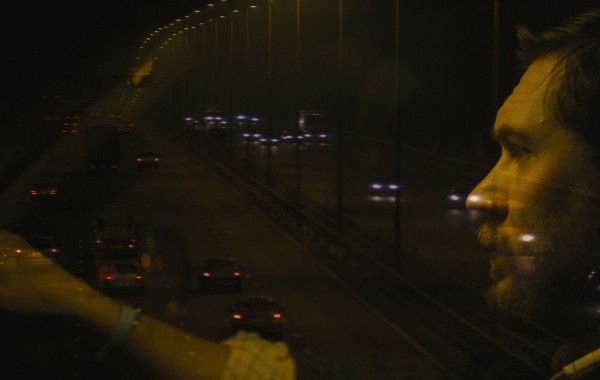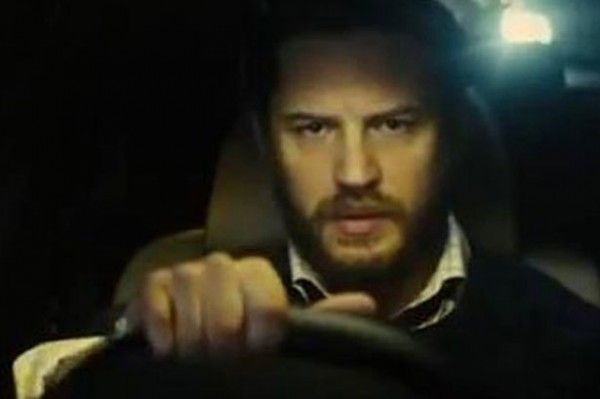When a film is executed under a series of conditions, it can feel like an exercise. It can come off like a director running a test rather than telling a story. But we also know that restrictions can spur creativity and yield unexpected results. Steven Knight’s Locke sets its conditions: a story told in real time where the protagonist is stuck behind the wheel of a constantly moving car, he’s the only character on screen, and he only talks to other characters over the phone. Under these conditions, Knight and star Tom Hardy have created a surprisingly captivating picture where adultery and concrete maintenance carry the same dramatic weight.
Ivan Locke (Hardy) is a building site manager driving to London in the middle of the night so he can be present for the birth of his illegitimate child. The child was born out of a one-night stand with former co-worker Bethan (Olivia Colman), and now he feels responsible to the point where he’s willing to obliterate the rest of his life. The foundation is about to be laid for his historic building, and he has to hand it off to his ill-equipped employee, Donal (Andrew Scott). Locke also has to fight off a cold, reassure their boss Gareth (Ben Daniels), comfort Bethan, and divulge the affair to his wife Katrina (Ruth Wilson), and hide it from their sons Eddie (Tom Holland) and Sean (Bill Milner).
Locke’s life is on the verge of being completely demolished, but he’s going to make sure it’s a controlled demolition. Knight and Hardy quickly establish the character as a pragmatist who believes he can bring order to the chaotic reverberations of his one massive mistake. We can see the builder’s mentality in his every action as he believes he can juggle handing off his passion project to Donal with the same care as telling Katrina that he’s about to have a child out of wedlock. It’s a life philosophy tested to its utmost, and we’re kept on the edge of our seats to see if Locke can continue to walk a tightrope where other men would have easily fallen off or simply avoided it altogether by refusing to even acknowledge their mistake.
Hardy is perfect as the calm center of this brewing maelstrom, and his every word comes out like it’s gripping a ledge. He is meticulous to the point where the emphasis on every syllable feels carefully chosen, and it makes for absolutely wonderful line delivery. Hardy not only taps into the character’s personality without missing a beat, but he also has the monumental task of holding the entire picture without having another actor in the same physical space, nor can he even stand-up. He’s behind the wheel of the car, and that’s all the body movement he’s allowed. From there, it’s gestures and facial expressions. To top it all off, he then has to make us care about the logistics of his job and buy lines like “You don’t trust God when it comes to concrete.” A lesser actor would flail at having to get us wrapped up in a passion for something as unremarkable as concrete, but with Hardy, you almost feel like he’s one step away from a tour-de-force reading of the phone book.
Rather than try to match his actor’s intensity, Knight just keeps the film feeling dynamic. The moving car is crucial. It may seem minor that the story is set on a highway rather than streets, but the momentum is essential in a film where your main character is sitting for 90 minutes. From there, Knight doesn’t need to throw in anything flashy. He measures the close-ups, long shots, and sets a steady rhythm as the traffic lights move past Locke’s face. The situation and Hardy’s performance keep us so on edge that even an incoming call can cause a slight panic attack, not to mention the thought of a car crash obliterating Locke’s delicate balancing act.
The film excels because of its constraints, and falters when unleashing Locke’s daddy issues as a means of exposition. Knight and Hardy clearly lay out the character as methodical, exacting, and pragmatic. He’s a person who believes he can have a calm and rational conversation with his wife about his adultery. To then have him angrily glare at the backseat in the rear-view mirror and hurl epithets at his father’s ghost feels out of character. It doesn’t seem like a coping mechanism for Ivan as much as it’s a way to explain to us why someone would risk his marriage and his job beyond feeling a moral obligation to be present for the birth of his illegitimate child.
One could expand Locke into grandiose notions—the car is the constant movement of life, concrete is a metaphor for the foundation of his life that’s crumbling, etc.—but the film works best in its claustrophobic crisis mode. It’s a constant battle as Locke fights for his profession, his marriage, and his mistake. Knight shows us the boundaries of his film, but that doesn’t make it any easier to breathe when those walls are closing in.
Rating: B+
Click here for all of our Sundance 2014 coverage. Click on the corresponding links for my other Sundance 2014 reviews:



